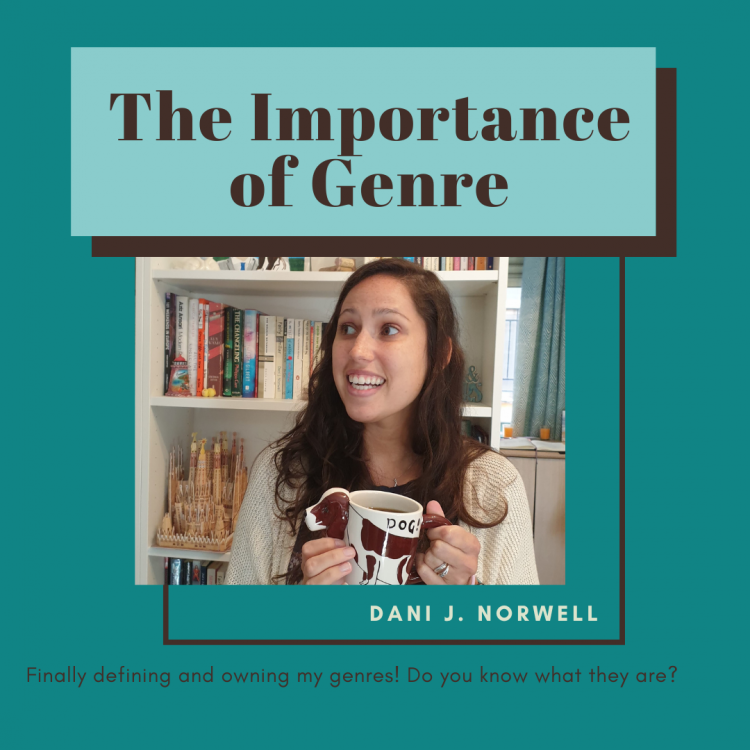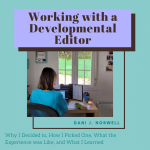The Importance of Knowing My Genre
Have you ever wondered what genre it is that I actually write? To be perfectly honest, so have I!
As you may know if you follow me on social media, I recently completed Sara Cannon’s Publish and Thrive course, which is all about self-publishing and thriving in your indie author career. I found this five-week course to be bursting with helpful information and tons of strategy, marketing, and goal-setting methods that I had not yet considered. Despite the depth and breadth of topics covered in the course, I must admit that it was one of the course’s simplest lessons that has kept me spinning my wheels.
That topic? The importance of genre!
Now, this may come across as the most obvious of questions for most writers. Many of the indie authors I know have been clear from the very start that what they write is young adult…or paranormal fantasy…or something as niche and specific as reverse harem…or inspirational small-town romance. I, on the other hand, have never felt so certain nor able to narrow down what it is that I write. As such, I’ve managed to get this far in my career without answering this simple question.
Now, I’m not judging myself for that. I know there’s a logical reason. Since Fairly Familiar and Snapshots of Spain were both collections of short stories, the categories (genres) available to me when listing my books were far more limited than they are for novels. Thus, I chose “short stories” as the primary genre and never needed to niche down much beyond that. However, now that I’m looking to break into novel-writing, getting clear on my genre(s) and my niche feels far more essential—and a little scary.
So, What Genre Do I Write?
After some soul-searching, I’ve come to the conclusion that the stories I write tend to fall into the genres of “literary fiction” and, usually, “women’s fiction” / “women’s literature.” I know this to be true, based on the publishing world’s definition of these two genres. As I don’t expect you to know exactly what those definitions are, here are the details I’ve homed in on.
Literary Fiction is defined in the following ways (most of this is in direct contrast with “contemporary” or “genre fiction”):
- It’s introspective, exploring the human condition, and striving to make sense of the world.
- It doesn’t follow any rules or formulas; anything can happen.
- It can be more difficult and/or uncomfortable to read.
- It’s character-driven (the development of the characters moves the plot along, not the inverse).
- It often has an ambiguous ending.
- It’s more likely to win awards, as it pushes boundaries and employs unusual storytelling and unique perspectives, but it’s more difficult to sell than genre fiction.
Women’s Fiction is defined in the following ways:
- It’s a wide-ranging literary genre that includes various types of novels that generally appeal more to women than men.
- The main character is a woman and her journey details emotional reflection and action that transforms her and her relationships with others.
- It’s about a woman on the brink of life change and personal growth.
- It taps into the hopes, fears, dreams, and even secret fantasies of women today.
- Some say this genre is “of women, by women, and for women” but that is not necessarily all there is to it. There are plenty of books written about women, authored by women, and/or marketed to women that do not meet the criteria above, which is the real focus of this genre.
- Finally, it’s important for me to note that “chick lit” is only a sub-genre of women’s fiction and is therefore not entirely interchangeable with the terms “women’s fiction” or “women’s literature.” “Chick lit,” which would include stories such as Bridget Jones’s Diary and Sex in the City, is perhaps the most profitable and marketable sort of women’s literature, but this light-hearted, often sexier form of women’s fiction is not the be-all end-all of what can be written in the genre.
What does all that really mean?
As you can probably tell based on the way I felt a need to defend these genres, I do fear that defining myself as a writer of literary fiction and, especially, as a writer of women’s fiction may be a bit divisive. On one hand, I feel confident that the writing I do should be categorized in this way due to the definition that is held in the writing world. On the other hand, I am hesitant about how it will be received by readers.
The truth is, many of us read and enjoy literary and women’s fiction on the regular. However, we can be resistant to those labels. I say this not just because I assume it to be the case, but because I got this feedback from my newsletter subscribers as well as from myself! I literally cringed when I thought about putting either of these terms in my author bio.
“Literary fiction” can sound pretentious and showy. Simply using the word “literary”—as opposed to “contemporary” or “genre”—fiction feels as if we are passing negative judgment on the genre’s counterpart. Just like using the label “women’s fiction” feels as if it’s relegating the target audience to having no better defining characteristics than their gender. I promise you, neither of these are my intention.
My intentions while writing literary and women’s fiction
My intention in defining my writing as fitting into either or both of these genres (it will depend on the main characters I write) is simply to categorize it correctly for new readers so that they can find and hopefully enjoy my books.
I know that those of you who have read and loved my work thus far enjoyed it not because you identify as female or male, but because you identified with the internal struggles and personal journeys of the main characters. I know that you appreciated the less-than-conventional story arcs, the sociological lens through which characters and relationships were explored. I’ve gathered that my stories have led to reader introspection too, which I absolutely love.
These will continue to be my intentions and the focus going forward. I will not suddenly attempt to make my writing more impressive by being needlessly wordy because of my “literary fiction” label. I will not suddenly stop writing deep, complex non-female characters because of my “women’s literature” label. Those are merely stereotypes of these genres and I intend to perpetuate neither.
I will simply be using these genres to guide my storytelling in a way that will continue to meet the expectations of my current readers, while also appealing to lovers of both of these genres. If I could be so bold, I would venture to guess that if you’re already one of my readers, you are a fan of literary and women’s fiction, even if you didn’t necessarily realize it.
Final Notes
I hope the content of this blog post has come as neither a surprise nor an affront to you. I’m not actually announcing anything new. I’m not actually changing my genre going forward. I’m simply putting a name to that which I’ve already been doing so that
- I, as the author, can be clear and intentional with how I write and market future books and
- You, as the reader, can know exactly what to expect from all future DJN books.
I will continue my intention of writing stories that are “real, raw, and relatable.” In fact, I believe that’s exactly the intention of literary fiction, as well as the sort of women’s fiction I plan to write. If you still find yourself disagreeing with that sentiment, I will say that I understand. The way that these genres—especially women’s fiction—are talked about in popular culture is not always complimentary.
However, I have decided that I want to fight that. I want to be a part of changing reader’s opinions and misconceptions. For this reason, I am making a commitment to no longer hide the fact that I write in these genres for fear of being misunderstood, overlooked, or controversial. I want to open up a discussion about why we often have negative feelings about these genres and when and where those sentiments are misguided.
I encourage you to join me in this debate. Please, feel free to share any thoughts you have in the comments here or with me directly by using my contact form. I am happy to hear your feedback and engage in respectful debate. I have done my research and am now comfortable with my proclamation of being a literary fiction and women’s fiction author, despite the distaste many have for such labels.
Are you among those who hate the term “women’s literature?” Do you feel too pretentious saying you read “literary fiction?” Or have I changed your mind? Please let me know!
xoxo,
DJN


1 thought on “The Importance of Genre”